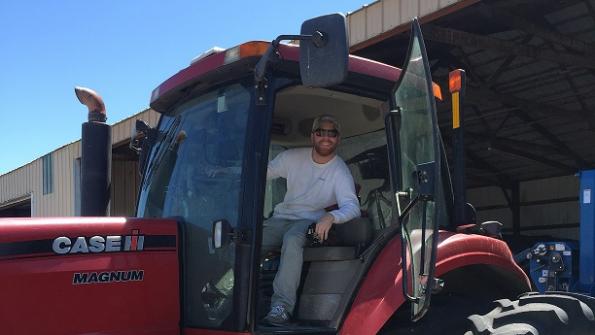July 21, 2016

Andrew Moreton, Manager at Moreton Partnership, Charleston, MO
Tell us a bit about yourself, your background, and your farm.
I grew up on our family farm in Charleston, Missouri. Moreton Partnership farms 5,000 acres of corn, wheat, and soybeans along the Mississippi River in Southeast Missouri. My great-grandfather Carleton Moreton started farming in 1937, and I am the fourth generation to farm. Our operation consists of seven full-time operators along with my grandfather, dad, and myself.
I worked on the farm growing up, then attended college at Southern Methodist University (SMU) in Dallas, Texas. While in college, I interned for a family friend who was a patent attorney and decided that it was an interesting field.
Upon law school graduation, I worked for Baker & McKenzie for six years, specializing in patent prosecution and litigation. Then I moved back home to work on our family business, and have been farming full-time since.
How do you define a farm's intellectual property (IP)?
A farm’s intellectual property is, broadly speaking, any intangible asset that the farm owns. While land, equipment, buildings, and the commodities grown on the farm are tangible assets that you can see and touch, the business processes, best methods, and branding would be intangible IP that the farm owns. Up to now, I haven’t seen farms really placing much value on their IP assets because they may not have thought there was any IP to protect. But I think we will see a change in the next 5-10 years with the next generation of farmers.
Why do you think a farm's business IP hasn't been formally defined and valued yet?
A farm’s intellectual property is much more difficult to define, and therefore value, than other IP in the agricultural industry. For example, equipment manufacturers can protect their new equipment designs and inventions with patents. Seed companies can protect newly developed plant varieties with plant patents. And all of these companies can protect their brands (names, logos, slogans, colors, etc.) with trademark. Each of these protections is an exclusive right granted by the government that allows the IP owner to exclude others.
But a farm’s primary business is not designing new equipment or writing software code, or even differentiating its grains from those of its neighbors—it is growing and selling plants that are inherently similar and by definition, commodities. Therefore, in a traditional IP sense, there hasn’t been a reason for a farm to protect its IP until very recently. Big data has changed that. All of the data that is collected over the course of a growing season is an intangible asset that is owned and controlled by someone. Forward-thinking farmers will want to ensure that any data collected on their farm is the farmer’s exclusive data and IP.
What systems do you currently use to create and protect your farm’s IP?
There are two main areas of IP that I have identified in my short time on the farm. First, on the business side, and since I started working on the farm, we have become Granular users. With Granular, we are able to keep track of all of our business practices in one place, and use that information to make decisions based on data and not just intuition.
On the precision farming and agronomy side, we are working to improve our collection of data for each field. We want to store that data in a way that we can later find it and then use it to analyze what we could improve on each field, and more specifically, what we could improve on particular parts of each field. Unlike the business side where we are seeing immediate value, this agronomy side may take several growing cycles before we can really see results, but we know that we need to start the process now.
How would you value or quantify it?
The key to protecting, and later valuing, our farm’s IP is ensuring that we have exclusive ownership of our data. Be careful signing any terms and conditions agreements and if you think the agreement is one-sided, it probably is. Ask questions if you do not understand who owns the data. It is important that the farm owns the data that comes from it. A farmer may decide to share this data outside of the farm, for example with crop consultants, but farmers need to make sure that they maintain exclusive ownership to it. Without that exclusivity, the information becomes much less valuable.
How will farmers benefit from valuing and protecting their IP?
We have been farming in this same area for almost 80 years and the evolution of how information is stored will make IP rights more important in the future. My great-grandfather and then grandfather’s generation kept data on paper records, if at all. My dad’s generation moved to Excel spreadsheets, but without proper formatting, it can be difficult and frustrating to make year-to-year decisions based exclusively on Excel. And those spreadsheets may only be stored on one computer or could be lost when changing computers. Now with cloud computing, we are able to more easily collect, record, access, and analyze data from any computer, smartphone, or tablet. This is beneficial to farmers who may share decision-making responsibility or who may not be able to see each field on a daily basis.
In the near future, farmers are going to have very large amounts of data generated from their farms, and I believe that there are going to be several opportunities to monetize this data—but only if it is data exclusively owned and controlled by the farmers. They will be able to selectively sell their data to equipment manufacturers, seed and chemical companies, software data aggregators, and marketing companies, for the right price.
However, right now, there are three main ways that I think farmers can benefit from their IP already:
Having access to this data allows farmers to become more efficient and profitable year after year
Farmers that are able to utilize data will be able to share information with landlords or potential landlords in order to differentiate themselves from other farmers that may be interested in renting the land.
If a landowner is looking to sell or rent their land, they may be able to negotiate more favorable terms by selling this data to the buyer or tenant.
As the field develops, there may be more and more opportunities that may not be readily apparent now.
Andrew Moreton is a manager at Moreton Partnership in Charleston, Missouri. He is a licensed attorney in Texas and pending in Missouri. He can be reached at [email protected].
About the Author(s)
You May Also Like






